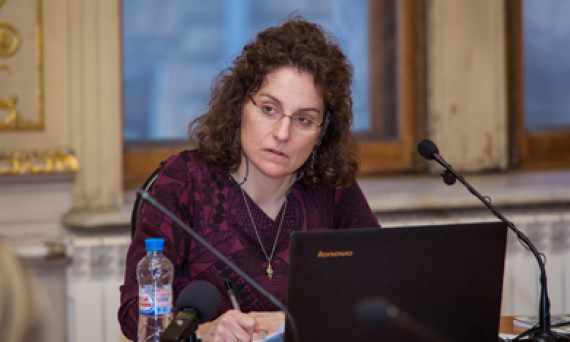On April 15th, Michele Rivkin-Fish (Professor of Anthropology, University of North Carolina, Chapel Hill) gave a lecture as part of an interdisciplinary seminar hosted by the EUSP’s Gender Studies Program and the Department of Political Science and Sociology.
 The lecture based on materials from Rivkin-Fish’s forthcoming book, was devoted to asking why the erroneous assumption about the inverse correlation between the number of abortions and the birthrate in Russia is rarely questioned and is used constantly in arguments by both politicians and social scientists. Assuming that this firm belief reflects broader characteristics of Soviet and post-Soviet biopolitics, Rivkin-Fish proposed to examine how it is critically conceptualized within national demographics.
The lecture based on materials from Rivkin-Fish’s forthcoming book, was devoted to asking why the erroneous assumption about the inverse correlation between the number of abortions and the birthrate in Russia is rarely questioned and is used constantly in arguments by both politicians and social scientists. Assuming that this firm belief reflects broader characteristics of Soviet and post-Soviet biopolitics, Rivkin-Fish proposed to examine how it is critically conceptualized within national demographics.
In the first part of her lecture, Rivkin-Fish outlined the features of Soviet biopolitics. On both levels, that of the political-ideological order and that of the centralized economy and public health system, the USSR implemented a pro-natalist project aimed at encouraging women to keep their pregnancies and have children. Soviet biopolitics contributed to the formation of a “culture of abortions”, in which the abortion was considered to be the main form of contraception. Women suffered from a lack of awareness about alternatives to prevent unwanted pregnancies. Turning to the contemporary Russian biopolitical project, Rivkin-Fish noted that the government has continued this pro-natal policy, reinforcing its religious moral attitudes.
In the second part of her report, Rivkin-Fish focused on three demographic studies: “Sotsial’no-gigienicheskie aspekty regulirovania razmerov sem’i [Socio-Hygienic Aspects of Regulating Family Size]” (E. Sadvokasova, 1969), “Regulirovanie rozhdenii v sovremennykh sem’yakh [Regulating Births in Modern Families]” (A. Popov, 1986) and “Osobennosti planirovaniya sem’i i rozhdaemost’ v Rossii: Kontratseptivnaya revoliutsiya—svershivshiisia fakt? [The Particularities of Family Planning and Fertility in Russia: Is the Contraceptive Revolution an Accomplished Fact?]” (S. Zakharov, B. Sakevich, 2007). Examining how these authors define the social conditions of family formation, problematize abortion and define the role of state to diminish the number of abortions, Rivkin-Fish described the development of a project of liberal biopolitics in Russian science. In her analysis she points to the internal contradictions of this project: on the one hand, Russian demographers deny the connection between a growing number of abortions and a decrease in the birth rate. On the other, however, they support the state’s pro-natalist project, recognizing its right to intervene in the private lives of families through social measures.
Anastasiya Novkunskaya
















